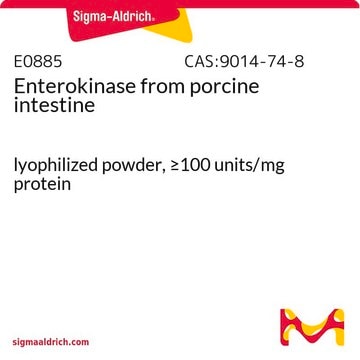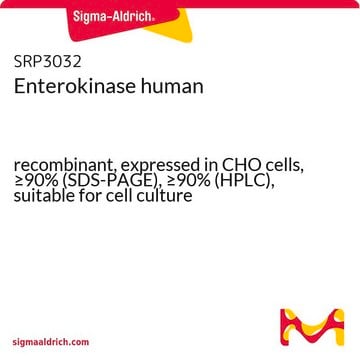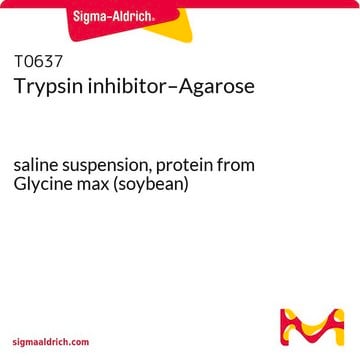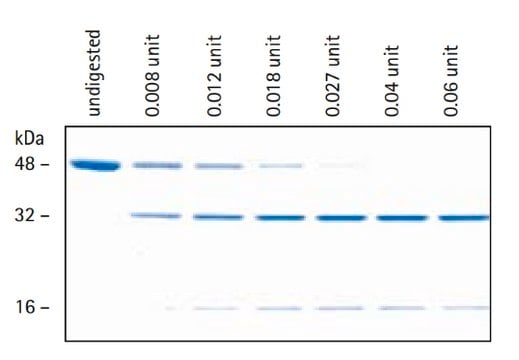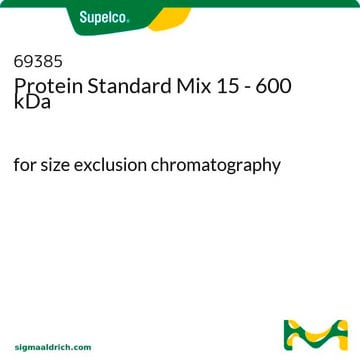E0632
Enterokinase from porcine intestine
≥0.5 units/mg solid
Synonim(y):
Enteropeptidase
Zaloguj sięWyświetlanie cen organizacyjnych i kontraktowych
About This Item
Polecane produkty
Postać
salt-free, lyophilized powder
aktywność właściwa
≥0.5 units/mg solid
masa cząsteczkowa
150 kDa
temp. przechowywania
−20°C
Szukasz podobnych produktów? Odwiedź Przewodnik dotyczący porównywania produktów
Powiązane kategorie
Zastosowanie
Enterokinase from porcine intestine has been used in a study to report a new experimental model of the anomalous pancreatico-biliary junction. Enterokinase from porcine intestine has also been used in a study to investigate the insulinotropic region of the gastric inhibitory polypeptide.
The enzyme from Sigma has been used for the activation of trypsinogen in order to measure the activity of trypsin in hog pancreas. The study showed that antimicrobial treatment reduces intestinal microflora and improves protein digestive capacity without changes in villous structure of weanling pigs.
Działania biochem./fizjol.
Enterokinase is a membrane bound serine protease that specifically and rapidly converts trypsinogen to trypsin, thereby, triggering the conversion of other zymogens to active enzymes. It has a molecular mass of approximately 150 kDa. The enzyme is a heterodimer consisting of 35-47 kDa subunits. The light and the heavy chains are linked by two disulfide bridges. It is a glycoprotein containing 35% carbohydrate. The polypeptide chain of trypsinogen is hydrolyzed only after an -(Asp)4-Lys- sequence. The enzyme is inhibited by soybean trypsin inhibitor. Enterokinase is typically used in protein modification and amino acid sequence determination.
Definicja jednostki
One unit will produce 1.0 nanomole of trypsin from trypsinogen per min at pH 5.6 at 25 °C.
substrat
Numer produktu
Opis
Cennik
Kod klasy składowania
11 - Combustible Solids
Klasa zagrożenia wodnego (WGK)
WGK 3
Temperatura zapłonu (°F)
Not applicable
Temperatura zapłonu (°C)
Not applicable
Środki ochrony indywidualnej
Eyeshields, Gloves, type N95 (US)
Certyfikaty analizy (CoA)
Poszukaj Certyfikaty analizy (CoA), wpisując numer partii/serii produktów. Numery serii i partii można znaleźć na etykiecie produktu po słowach „seria” lub „partia”.
Masz już ten produkt?
Dokumenty związane z niedawno zakupionymi produktami zostały zamieszczone w Bibliotece dokumentów.
Thomas Thymann et al.
The British journal of nutrition, 97(6), 1128-1137 (2007-03-27)
The immediate post-weaning period is often associated with gut malfunction and diarrhoea for young pigs. Administration of antimicrobials remains an effective way to control weaning diarrhoea but it remains unclear how they affect gut physiology and microbiology although this is
T Benhidjeb et al.
Journal of pediatric surgery, 31(12), 1670-1674 (1996-12-01)
A model of anomalous pancreatico-biliary junction was developed and used to investigate a possible role in the development of choledochal cyst and tumors of the biliary tract. An anastomosis was constructed between an isolated pancreas-duodenal segment and the gallbladder in
Werner Hartwig et al.
Surgery, 144(3), 394-403 (2008-08-19)
A noninvasive model of necrohemorrhagic pancreatitis induced by simultaneous intravenous cerulein/enterokinase (EK) infusion has recently been established in rats. The aim of the present study was to establish this new model in mice and to compare it with the rat
Complementary DNA cloning and sequencing of rat enteropeptidase and tissue distribution of its mRNA.
N Yahagi et al.
Biochemical and biophysical research communications, 219(3), 806-812 (1996-02-27)
A cDNA clone encoding enteropeptidase (EC 3.4.21.9), a key enzyme for the conversion of trypsinogen to trypsin, was isolated from a rat duodenal mucosa cDNA library. Sequences of the 3585 base pair clone predicted that enteropeptidase is synthesized as a
G W Morrow et al.
Canadian journal of physiology and pharmacology, 74(1), 65-72 (1996-01-01)
Glucose-dependent insulinotropic polypeptide or gastric inhibitory polypeptide (GIP) is a 42 amino acid intestinal hormone, which exhibits several direct and indirect effects on fat and glucose metabolism. To determine the bioactive region(s) of the molecule, synthetic and proteolytic fragments of
Nasz zespół naukowców ma doświadczenie we wszystkich obszarach badań, w tym w naukach przyrodniczych, materiałoznawstwie, syntezie chemicznej, chromatografii, analityce i wielu innych dziedzinach.
Skontaktuj się z zespołem ds. pomocy technicznej